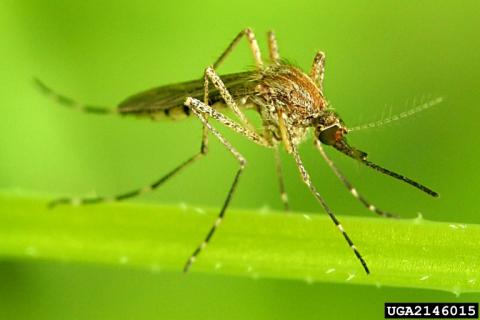Dealing with Backyard Mosquitoes

Every summer I try to spend every moment I can outdoors. The only thing that threatens to send me into the house is the constant drone of hungry mosquitoes. Not only is the buzzing in my ears annoying, but the scores of raised, itchy, red bites on my skin are enough to drive me mad. If you’re like me, you may often yourself wishing that all of the mosquitoes in the backyard would just disappear. Despite the discomfort, aggravation, and even disease issues they can cause, the rational part of my mind recognizes that mosquitoes are a natural and important part of the natural world. They are an essential food source for a wide variety of wildlife species. Bats, birds, amphibians, fish, and predatory insects such as dragonflies all feed on adult mosquitoes and their larva. Clearly, entirely getting rid of mosquitoes in the environment isn’t an option. Instead, it’s better for us focus on methods that reduce mosquito numbers in the backyard.
Eliminating prime mosquito habitat is a good place to start. What mosquitoes need more than anything is an appropriate breeding site. All mosquito species require slow moving or stagnant water to lay their eggs. Anything that can trap or hold water for an extended period of time can serve as a suitable mosquito breeding ground. Bird baths, garbage bins, or even old tires should be either removed or emptied on a frequent basis to destroy mosquito larva. Take things one step further by cutting tall weeds and mowing grassy areas around the house that can serve as shelter and resting sites for adult mosquitoes.
Although it may be tempting to use pesticide sprays to reduce mosquito numbers, don’t be too hasty. Sprays and fogging chemicals do not control mosquitoes in the long-term and provide only temporary relief. Chemicals are usually applied to shady sites and tall grass and shrubs where mosquitos like to rest. Keep in mind that beneficial insects often reside in the same habitats as mosquitoes. Pollinators and predatory insects can be harmed by the same sprays that are toxic to mosquitoes. If you do decide to spray, consider hiring a licensed professional pest control applicator. Other mosquito backyard control options are available too, although their effectiveness varies widely. Mosquito traps and citronella candles/torches may provide some relief if wind conditions and airflow patterns are right.
Changing your own behavior can also reduce overall contact with mosquitoes. Mosquitoes tend to be most active in the morning and evening, so avoiding being outside at those times can make a big difference. If you have to be outdoors when mosquitoes are an issue, wear long pants, a long-sleeved shirt and a hat to keep the majority of the insects away. Using an insect repellent will provide additional protection. How effective an insect repellent product is depends entirely on its active ingredient(s) and their concentration. In my experience, I’ve found repellents containing DEET to be the most valuable. These repellents seem to last longer and keep the mosquitoes at bay better than anything else I’ve tried (and trust me, I’ve tried a lot of different products). For those who are averse to using chemicals and prefer a more natural approach, there are repellents made from natural oils or herbs. Whichever repellent you choose, make sure to always read and follow the label instructions.
Ultimately, there is no way to completely eliminate mosquitoes from the backyard. They have always been a part of the natural ecology of New Hampshire and will continue to be so. Our job isn’t to get rid of mosquitoes, but to find ways to either avoid or live with them.
Got questions? The Ask UNH Extension Infoline offers practical help finding answers for your home, yard, and garden questions. Call toll free at 1-877-398-4769, Monday to Friday, 9 a.m. to 2 p.m., or e-mail us at answers@unh.edu.
Related Resource(s)
Do you love learning about stuff like this?
SUBSCRIBE TO Granite State Gardening newsletter
Got questions? The UNH Extension Yard and Garden Infoline offers practical help finding answers for your yard and garden questions.
Call toll free at 1-877-398-4769, Monday to Friday, 9 a.m. to 2 p.m., or fill out webform.
